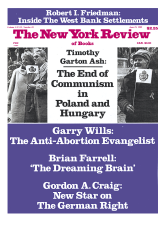His advisers report that President George Bush’s response to General Manuel Antonio Noriega’s successive effronteries has been to examine his options. This is an endeavor hopeless for engagements with Noriega, who is one of those farseeing statesmen who understand that to weigh any variety of options is to risk being intruded upon by thoughts of what might be best for persons other than themselves, and perhaps even to risk being distracted by considerations of morality.
If Noriega had ever been thus inhibited, he would not have been so quick to recognize the emergence of the Colombian drug cartel as a source of economic development funds in larger bundles and with looser strings than he was apt to get from older and less free-handed superpowers.
To feed off the United States is to subject yourself to all sorts of inconveniences from a Senate where Jesse Helms arraigns your friendship with Fidel Castro one day and Christopher Dodd your human rights record the next. But to take your business to the Medellín and Cali cartels is to be liberated from even the lightest chains of ideology.
The Colombians have an estimated $8 billion annual trade volume, eight thousand employees, their own two-thousand-member army, and a view of foreign alliances that echoes Palmerston’s dictum that nineteenth-century England had no friends but only interests.
A succinct history of Noriegan Panama’s progress as Medellín’s major allied power has been compiled by the Senate subcommittee on narcotics and terrorism, whose chairman is John Kerry, Democrat of Massachusetts. Ramón Lillian Rodríguez, a fallen Medellín agent, told Kerry’s committee that Noriega took over its money laundering and provided it with Panamanian army security services for commissions ranging from one half to 10 percent of each transaction.
In due course, Noriega found Rodríguez too expensive to carry as a middleman and turned him in to the US Drug Enforcement Administration, a service to law enforcement that was rewarded with a letter of commendation. By then, Noriega had equipped himself for the 1984 election by assembling a personal account amounting to $20 million in one of the hundred banks that had sprung up in Panama, half of them owned by Colombians.
He maintained an arms business whose philosophy was true to Medellín’s loftily ecumenical view of competing political faiths. In 1979, he supplied the Sandinistas fighting Somoza and then, when their revolution triumphed too quickly, he found himself stuck with a consignment they no longer needed. He salvaged his investment by selling it to the Salvadoran guerrillas, and the trade went well until one delivery plane crashed and turned out to belong to the Panamanian Defense Forces, a revelation sufficiently embarrassing to force Noriega to start selling to the contras instead. He was solicitous in tenders of his good will equally to Fidel Castro and the United States, although in the latter case his preference was for dealing with the CIA, the DEA, and the National Security Council, all of whom shared his taste for the covert and the conspiratorial and none of whom thought to abrade the comity of their conversations with references to narcotics.
Once he sent word that, if the United States would go back to speaking well of his stewardship, he would return the favor by arranging the assassination of the Sandinista comandantes. Oliver North replied that this would violate the laws of the United States but that a bit of sabotage would be fit and proper.
That cannot have been the first time Noriega had noticed how much more sophisticated Medellín’s government is than ours. Still, he has profited handsomely from Medellín worldly wisdom and lived comfortably with American naiveté and can be excused for thinking even now that he can go on doing both.
This Issue
June 15, 1989



